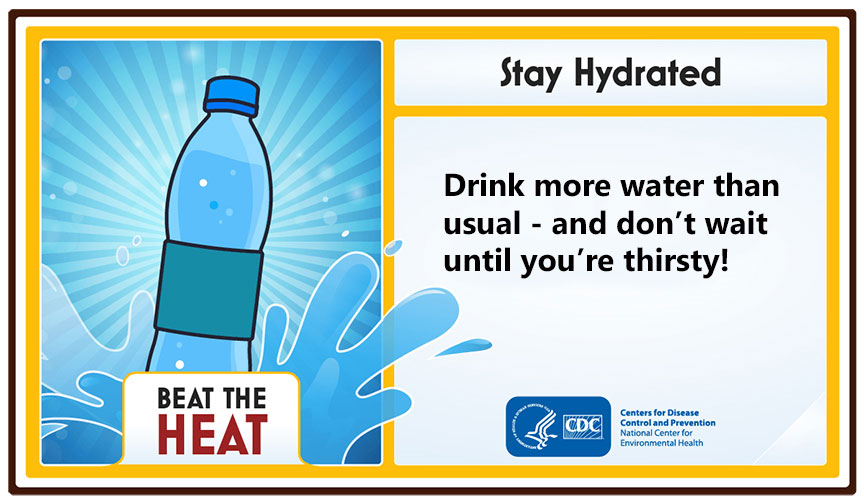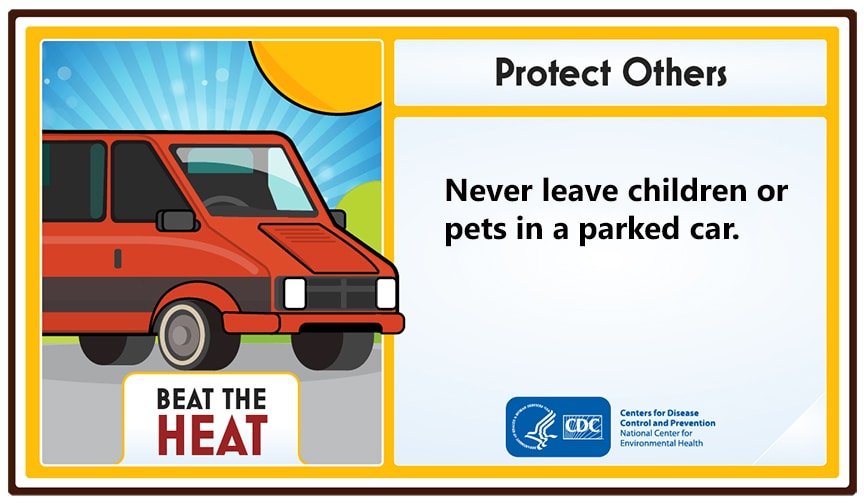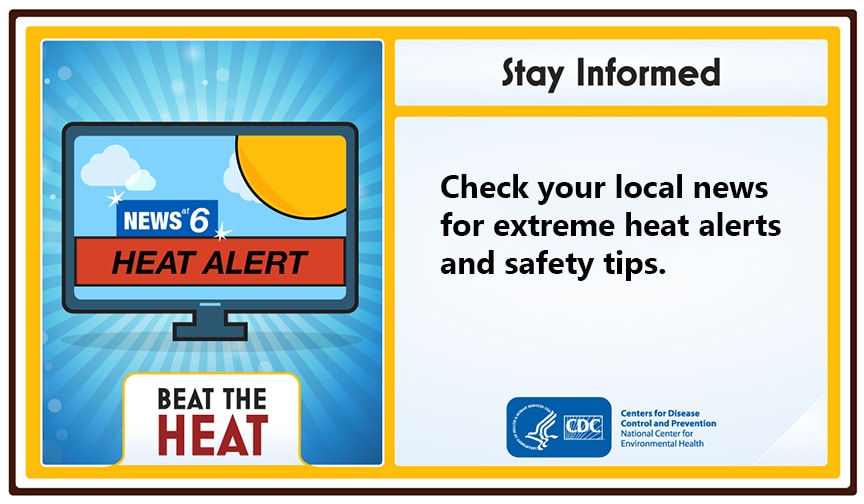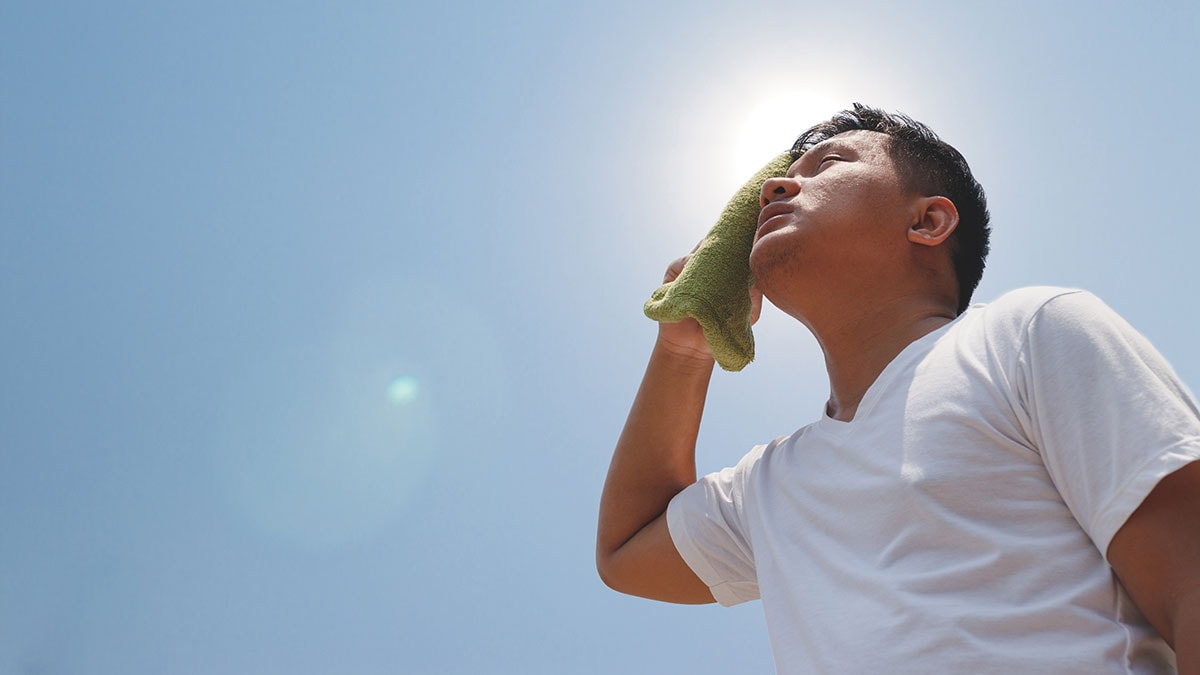At a glance
The effects of rising temperatures and extreme heat result in numerous illnesses and deaths each year.
Overview
For many people, warm weather is a time for fun-filled outdoor activities. However, hot weather and outdoor activities don't always mix well, especially during periods of extreme heat— times when temperatures are substantially hotter and/or more humid than average for a location and date.
Extreme heat can cause people to suffer from heat-related illness, and even death. People suffer heat-related illness when their bodies are unable to properly cool themselves. Older adults, young children, and people with chronic medical conditions are at high risk for heat-related illness and death. More than 700 people die from extreme heat every year in the United States.
Warmer temperatures can mean higher ozone levels. Pay attention to the U.S. Environmental Protection Agency's Air Quality Index when planning outdoor summer activities, especially if you have asthma or another lung disease.
Track extreme heat in your area. The CDC Heat & Health Tracker provides local heat and health information so communities can better prepare for and respond to extreme heat events. You can use it to explore how extreme heat affects your county, populations that are at risk, and resources for response.
Steps to Protect Yourself
When temperatures are extremely high, take steps to protect yourself and your loved ones:
- Stay in an air-conditioned indoor location as much as you can.
- Drink plenty of fluids even if you don't feel thirsty.
- Schedule outdoor activities carefully.
- Wear loose, lightweight, light-colored clothing and sunscreen.
- Pace yourself.
- Wear loose, lightweight, light-colored clothing and sunscreen.
- Take cool showers or baths to cool down.
- Check on a friend or neighbor and have someone do the same for you.
- Never leave children or pets in cars.
- Check the local news for health and safety updates.
Reminder
Social Media Graphics



Related Links
Most Relevant
CDC Related Links
Additional Resources
Multimedia
Social Media
Before:
Extreme #heat can be a serious threat to your health. Learn the warning signs:
https://www.cdc.gov/extreme-heat/signs-symptoms/index.html
Temperatures are rising! Share @CDCgov infographic on how to beat the #heat.
https://www.cdc.gov/natural-disasters/communication-resources/beat-the-heat-infographic.html
During:
Experiencing extreme #heat in your area? Drink more water than usual and don't wait until you're thirsty:
https://www.cdc.gov/extreme-heat/prevention/index.html
Extreme #heat in the forecast? Check on elderly neighbors who are at higher risk for heat-related illness:
https://www.cdc.gov/extreme-heat/risk-factors/extreme-heat-and-older-adults-aged-65.html
Did you know that sunburn can slow the skin's ability to release excess #heat? More heat safety tips:
https://www.cdc.gov/extreme-heat/prevention/index.html
If your body can't cool down properly it can cause #heat stress. Learn the warning signs:
https://www.cdc.gov/extreme-heat/signs-symptoms/index.html
#Heatwave Tip: Never leave #children or #pets alone in closed vehicles.
https://www.cdc.gov/extreme-heat/prevention/index.html
Working outside? Drink plenty of non-alcoholic fluid and take breaks often! #heatwave
https://www.cdc.gov/extreme-heat/risk-factors/heat-and-outdoor-workers.html
Experiencing a #heatwave? Wear lightweight, light-colored, loose-fitting clothing.
https://www.cdc.gov/extreme-heat/prevention/index.html
Be a good neighbor! Check on elderly neighbors who are at higher risk for heat-related illness.
https://www.cdc.gov/extreme-heat/risk-factors/extreme-heat-and-older-adults-aged-65.html
Extreme heat can make you seriously ill. Know the signs and how to prevent illness.
https://www.cdc.gov/extreme-heat/signs-symptoms/index.html
Heat cramps, heat exhaustion & heat stroke—know the symptoms and what to do when they occur:
https://www.cdc.gov/extreme-heat/signs-symptoms/index.html
Sunburn can slow the skin's ability to release excess #heat. Avoid sun exposure and remember sunscreen!
https://www.cdc.gov/extreme-heat/prevention/index.html
Never leave kids or pets alone in vehicles—always check the backseat!
https://www.cdc.gov/extreme-heat/prevention/index.html
Muscle cramping, heavy sweating, weakness and dizziness are symptoms of heat exhaustion. Know what to do:
https://www.cdc.gov/extreme-heat/signs-symptoms/index.html
People age 65+ are less likely to sense and respond to changes in temperature. Check on your loved ones:
https://www.cdc.gov/extreme-heat/risk-factors/extreme-heat-and-older-adults-aged-65.html
Never leave children or pets alone in vehicles. Car temperatures can quickly turn deadly.
https://www.cdc.gov/extreme-heat/prevention/index.html
Sunburned skin releases excess heat slower, making it harder to cool off. Use sunscreen and avoid the burn.
https://www.cdc.gov/extreme-heat/prevention/index.html



